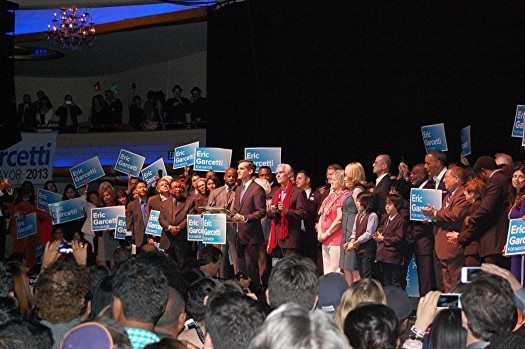
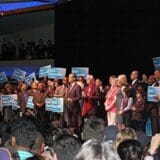
Councilmember Eric Garcetti’s two-year campaign to become Los Angeles’ first Jewish-Mexican-Italian-American mayor ended in victory early this morning when his challenger, City Controller Wendy Greuel, phoned the candidate shortly before 2 a.m. to concede.
A preliminary count released by the L.A. City Clerk’s office put the margin of victory at eight points, with Garcetti taking 53.92 percent to Gruel’s 46.07 percent. Those numbers mirrored an unofficial Loyola Marymount exit poll taken earlier on Tuesday.
With 380,108 total votes cast, Garcetti’s victory comes amid one of the lowest voter turnouts ever for an L.A. mayor’s race, with a mere 19 percent of registered voters bothering to cast a ballot.
Early returns had Greuel out in front by a slim two-point margin. And while the Garcetti camp remained publicly confident throughout the evening, campaign insiders were nervously eying their smart phones, worried that an especially low turnout could result in the kind of squeaker that would deny their candidate a definitive win until the City Clerk’s official tally three weeks from now.
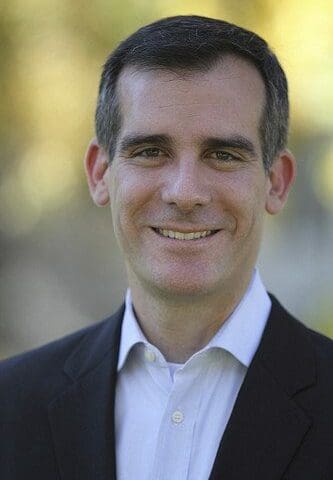

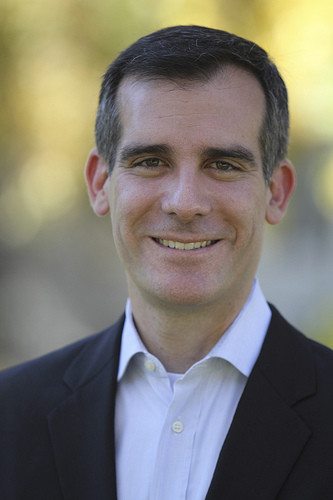 Although voters had been warned that it might take weeks after Election Day for a winner in the Los Angeles mayoral race to be declared, outgoing City Councilman Eric Garcetti decisively bested the outgoing Controller, Wendy Greuel, to become the city’s 42nd mayor. Garcetti, 42, will take office July 1.
Although voters had been warned that it might take weeks after Election Day for a winner in the Los Angeles mayoral race to be declared, outgoing City Councilman Eric Garcetti decisively bested the outgoing Controller, Wendy Greuel, to become the city’s 42nd mayor. Garcetti, 42, will take office July 1.
The race, which had been predicted by some pollsters to be headed toward a dead heat, was effectively over by 11 p.m. last night, when Garcetti pulled ahead of Greuel and never looked back. In a forecast of his victory made hours before, exit polling by Loyola Marymount University showed Garcetti ahead by a comfortable eight points.
By 3:15 a.m. Wednesday, the City Clerk’s final election bulletin placed the vote count as 181,995 for Garcetti (53.92 percent) and 155,497 (46.07 percent) for Greuel.
Frying Pan News will post first-hand coverage of scenes from the two candidates’ Election Night celebrations later this morning.


 Los Angeles’ polls close at 8 p.m. tonight, so there’s plenty of time to vote – and brush up on who and what is on the ballot. Frying Pan News, which does not endorse candidates, has been providing election coverage throughout the spring — offering in-depth interviews with mayoral hopefuls Wendy Greuel and Eric Garcetti, as well as asking political thinkers like Raphe Sonenshein and Jonathan Parfrey their opinions on what L.A.’s next mayor should do in his or her first term. We also sent veteran reporter Marc Haefele around town to ask what advice (and complaints) voters have for City Hall.
Los Angeles’ polls close at 8 p.m. tonight, so there’s plenty of time to vote – and brush up on who and what is on the ballot. Frying Pan News, which does not endorse candidates, has been providing election coverage throughout the spring — offering in-depth interviews with mayoral hopefuls Wendy Greuel and Eric Garcetti, as well as asking political thinkers like Raphe Sonenshein and Jonathan Parfrey their opinions on what L.A.’s next mayor should do in his or her first term. We also sent veteran reporter Marc Haefele around town to ask what advice (and complaints) voters have for City Hall.
For a complete index of our features, see Frying Pan News’ Next L.A. section.
» Read more about: The Polls Are Open — Read Before You Vote! »
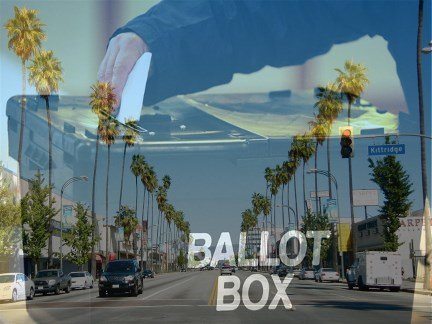

When you see a news story about Election Day in Los Angeles there’s a good chance it’s not about any issues or personalities involved during any one campaign, but about the city’s poor voter turnout. Depending on who you read, L.A. is the city that is too lazy for democracy, or too cool, bored or indifferent. Watching our turnout numbers fall has become a spectator’s sport, like watching a limbo dancer – how low can we go?
But whether 200 or two million people vote today, the future of this city cannot be sneered or shrugged away. We remain a troubled town with infinite resources, a divided city with the potential for great unity. Pundits may bemoan a sameness with the two mayoral candidates, or the lack of sexy ballot initiatives, but like it or not, Los Angeles will begin changing July 1, when the new mayor takes office.


(Editor’s Note: Last week Randy Shaw broke the story, which follows below, about a plan by U.C. Berkeley to use FEMA to clear-cut thousands of trees in the Berkeley-Oakland hills. Shaw’s story provoked an outcry of protest, which he details here, in this followup post.)
The Federal Emergency Management Agency (FEMA) is moving to chop down 22,000 trees in Berkeley’s historic Strawberry and Claremont Canyons and over 60,000 more in Oakland. This destructive plan is rapidly moving forward with little publicity, and FEMA cleverly scheduled its three public meetings for mid and late May while U.C. Berkeley students were in finals or gone for the summer. U.C. Berkeley has applied for the grant to destroy the bucolic Strawberry and Claremont Canyon areas, claiming that trees pose a fire hazard. The school has no plans to replant, and instead will cover 20 percent of the area in wood chips two feet deep.
» Read more about: U.C. to Strawberry Canyon Trees: Drop Dead »
In recent weeks, Congress has been looking into last year’s outbreak of meningitis, which killed 53 people and injured more than 700 Americans in 20 states. The cause was a tainted steroid distributed by the New England Compounding Center (NECC), which is part of an obscure $2 billion-a-year niche of the pharmaceutical industry called “compounding pharmacies.” Recent reports document that this rogue industry is out of control, operating dangerously in the shadows and putting the lives of millions of Americans at risk. Democrats have been trying to give the Food and Drug Administration (FDA) the authority to regulate this shadowy niche of the drug industry, but the companies and their Republican allies have pushed back, arguing that states can do a better job and that stronger federal regulations aren’t needed.
Sometimes it takes a scandal to get the public’s attention, but it also helps to have a courageous figure who takes on big business to protect public health and safety.
» Read more about: Thalidomide Tragedy: A Lesson for Today »
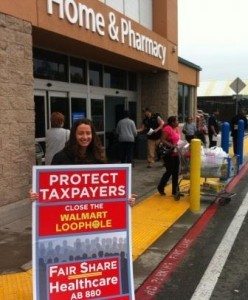
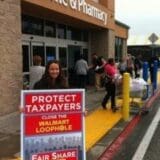
 Dozens of Stockton-area workers and seniors streamed into the parking lot of the Walmart Supercenter [Thursday] morning to deliver an important message: Walmart must pay its fair share for health care.
Dozens of Stockton-area workers and seniors streamed into the parking lot of the Walmart Supercenter [Thursday] morning to deliver an important message: Walmart must pay its fair share for health care.
It was the second stop on the statewide “Close the Walmart Loophole” tour.
Not even the grey sky or the rainy weather could dampen the spirits of the members of AFSCME [American Federation of State, County and Municipal Employees], UFCW [United Food and Commercial Workers], Teamsters and other unions and seniors from the California Association of Retired Americans who all came together to fight for what is right for taxpayers.
Richard Andazola, President of the San Joaquin-Calaveras Central Labor Council:
“We’re here to send a message that a few big corporations like Walmart shouldn’t get to evade the law just because they have an army of lobbyists on their side.
» Read more about: Stockton Workers and Seniors Fight “Walmart Loophole” »
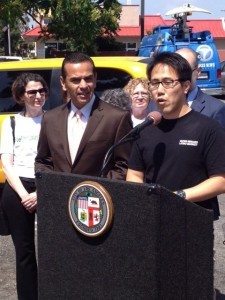

On May 15, Los Angeles Mayor Antonio Villaraigosa celebrated the launch of the L.A. Department of Water and Power’s Small Business Direct Install (SBDI) energy efficiency program at Supermercado Latino, a neighborhood market near Memorial Coliseum in South Los Angeles. The market received free retrofits that will save it 44 percent on utility bills while helping reduce L.A.’s reliance on coal power. SBDI is one of the key initiatives won by RePower LA, a coalition committed to saving Angelenos money on their energy bills, reducing dependency on dirty coal and creating local, career-path jobs for L.A.’s hardest-hit areas. RePower LA has also been instrumental in the creation of the Home Energy Improvement Program (HEIP) and the Utility Pre-Craft Training program (UPCT).
“The cleanest, cheapest energy is the energy you don’t use,” said Villaraigosa. “The Small Business Direct Install program helps reduce the carbon footprint of small businesses that would otherwise be unable to afford energy audits and retrofits.”
Through the SBDI,
» Read more about: Mayor Applauds RePower LA’s Small Business Program »
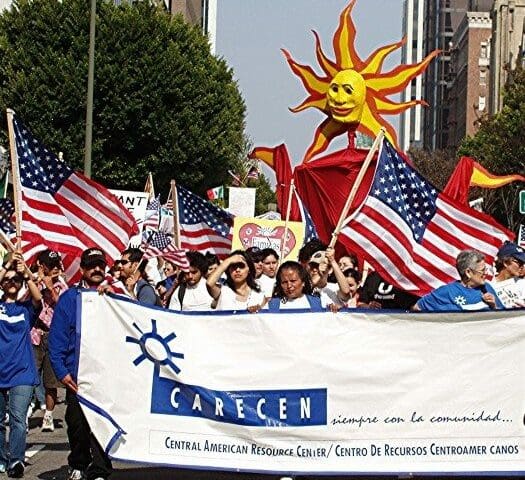
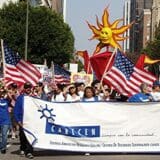
Maria Elena Durazo serves as Executive Secretary-Treasurer of the Los Angeles County Federation of Labor, which represents more than 600,000 union workers. She is also the Chair of the National AFL-CIO’s Immigration Committee and recently spoke to Frying Pan News about the pending immigration bill in Congress, as well as a new student film competition that her organization and UNITE HERE are sponsoring. (Part 1 of this interview appeared yesterday.)
Frying Pan News: Is there something in particular that bugs you about the immigration bill?
Maria Elena Durazo: Yes! We want to make sure that there’s an alternative to the past guest worker model. We’re hopeful that we can fix the language through what’s commonly referred to as the Labor-Chamber agreement. There are three elements to it. One, that there be an objective, data-driven analysis of the future needs of workers in this country.
» Read more about: The New America: A Talk With María Elena Durazo, Part 2 »


Phoenix, Arizona — Amber Zenzak, an office manager at a small carpet-cleaning company, took a moment recently to consider what life would be like each week without state support for child care for her children ages 3, 4, and 9.
“My day care costs would be $100 more than what I gross a week. My family would be out on the street,” she said, choking back tears and referring to the stability it provides.
“Those three young children would have nowhere to go, no food to eat. That’s not a situation that children should be in.”
Calls for the security and stability of children throughout the country, especially in Arizona and California, are continuing to surface, as families strive to earn a living in an economy that is still feeling the pinch of the Great Recession.
Requests for lawmakers to protect child care and other social services are occurring as many state budgets remain constrained and spending priorities are weighed and scrutinized.
» Read more about: Western Families Face Child Care Service Cuts »
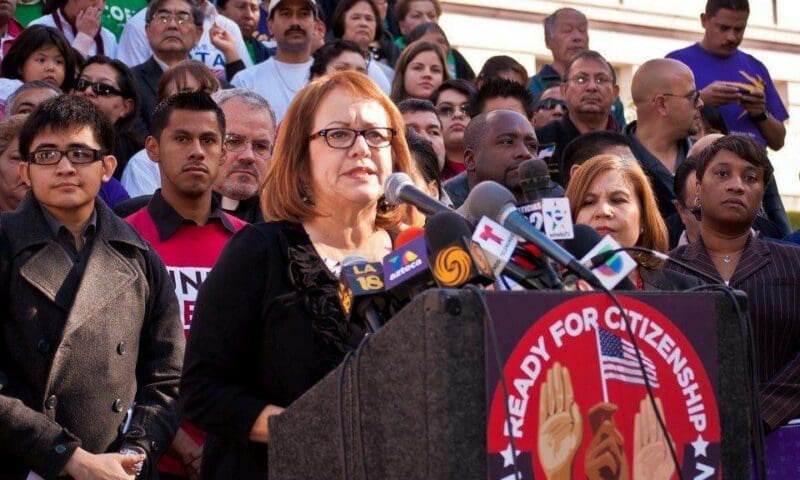
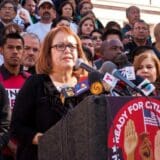
Seven years ago María Elena Durazo, the head of the Los Angeles County Federation of Labor, stood on a stage erected at the intersection of Wilshire Boulevard and La Brea Avenue, facing a sea of demonstrators who had just paraded miles in support of immigrant rights. In the twilight of that May Day, as Durazo addressed several hundred thousand people, the march for immigration reform seemed unstoppable – an irresistible historic tide that was poised to sweep away any objections.
Then came an angry backlash that saw anti-immigrant legislation passed in Arizona and Alabama that made Proposition 187 – California’s 1994 ballot initiative curbing immigrant rights – seem tame by comparison. Frying Pan News sat down with Durazo to discuss the pending immigration bill in Congress, as well as a new student film competition that her organization is sponsoring with UNITE HERE, a union whose members are largely immigrants.
» Read more about: The New America: A Talk With María Elena Durazo, Part 1 »


Many of you soon-to-be college graduates are determined to make the world a better place. Some of you are choosing careers in public service or joining nonprofits or volunteering in your communities.
But many of you are cynical about politics. You see the system as inherently corrupt. You doubt real progress is possible.
“What chance do we have against the Koch brothers and the other billionaires?” you’ve asked me. “How can we fight against Monsanto, Boeing, JP Morgan and Bank of America? They buy elections. They run America.”
Let me remind you: Cynicism is a self-fulfilling prophesy. You have no chance if you assume you have no chance.
“But it was different when you graduated,” you say. “The Sixties were a time of social progress.”
You don’t know your history.
When I graduated in 1968, the Vietnam War was raging. Over half a million American troops were already there.
» Read more about: College Graduates: Cynicism Is a Self-Fulfilling Prophesy »
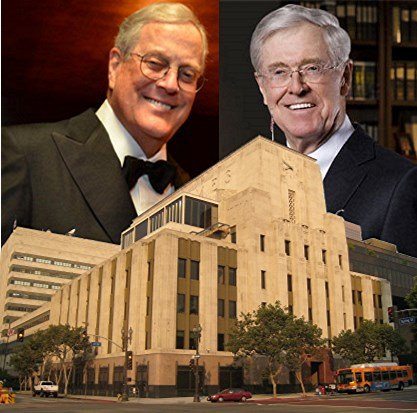

The L.A. Times has not exactly been falling all over itself lately to curry favor with the city’s labor movement, with a seemingly endless stream of news stories, columns and editorials portraying unions in a less than sympathetic light. So the last thing one might have expected to see was a rally of workers and labor leaders coming to the defense of L.A.’s paper of record.
But desperate times call for desperate measures – and with the Koch brothers potentially poised to take over Spring Street, the present moment certainly meets the test.
In case you have tuned out the Times and every other source of local news, Charles and David Koch – patron saints of the Tea Party, best friends to climate change deniers and bankrollers of an endless parade of far-right causes – have set their sights on the Tribune Company’s empire. After emerging from a bankruptcy brought on by the rapacious practices of former owner Sam Zell,
» Read more about: Desperate “Times” at Anti-Koch Brothers Rally »


[Frying Pan News Note: A New York Times piece posted last night by Steven Greenhouse — and referenced below — revealed that “newly found documents indicate that apparel had been produced for Walmart at one of the operations in the factory building that collapsed last month.”]
The most dangerous job in the world, outside war zones, isn’t that of an undercover police officer or a firefighter or a bullfighter or aerialist. It’s sewing garments — particularly in Bangladesh.
The death toll in the April 24 collapse of Rana Plaza has topped 1,100 and continues to rise. But Rana Plaza is merely the most deadly of an unbroken string of preventable disasters that have plagued garment manufacturing in Bangladesh, the world’s second-largest exporter of clothing, behind only China. It’s not even the most recent preventable disaster: Since the cataclysmic building collapse,
» Read more about: Harold Meyerson: Walmart and Bangladesh’s Death Traps »
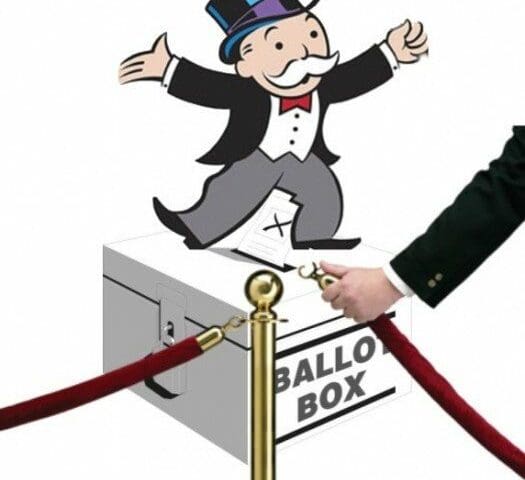

 Driven by disgust for the way our democracy seems to be for sale to the highest bidder, several dozen activists from Los Angeles gathered in Mount Washington this past Saturday to rally support for Proposition C, a symbolic measure on the May 21 ballot that urges area legislators to push for renewed limits on political campaign spending.
Driven by disgust for the way our democracy seems to be for sale to the highest bidder, several dozen activists from Los Angeles gathered in Mount Washington this past Saturday to rally support for Proposition C, a symbolic measure on the May 21 ballot that urges area legislators to push for renewed limits on political campaign spending.
In late February, the Los Angeles City Council voted 10 to 1 to put the following question on the ballot, introduced by Councilmember Richard Alarcon, who represents the northeast San Fernando Valley and who attended the Mount Washington gathering:
“Shall the voters adopt a resolution that there should be limits on political campaign spending and that corporations should not have the constitutional rights of human beings and instruct Los Angeles elected officials and area legislative representatives to promote that policy through amendments to the United States Constitution?”
By itself,
» Read more about: Making a “C” Change in Campaign Spending »
Yesterday members of Warehouse Workers United and their supporters confronted Scot Rank, the CEO of scandal-plagued Walmart de Mexico, at UCLA’s Anderson School of Business. The warehouse employees are fighting for improved working conditions at warehouse facilities operated by Walmart contractors. This raw video captures the protest.
» Read more about: Walmart de Mexico CEO Confronted at UCLA »
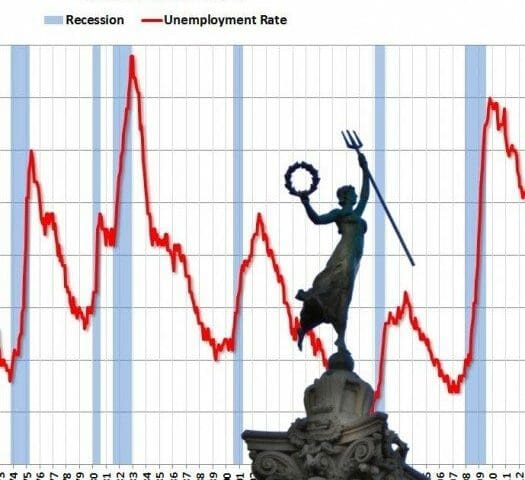

Some 53 percent of Americans say that the second Iraq war was a mistake. A recent Los Angeles Times article asked if the war brought change for the better. But no one asks what that war cost this country. The first trillion dollars we spent on it was only a down payment on what experts have estimated to be probably two trillion or more that we will spend over the next few decades to take care of America’s wounded and maimed. Our taxes provide care for those veterans, but both parties regularly propose cutting the Department of Veterans Affairs as a quick fix to balance the federal budget.
Covering the interest on the debt from this and other wars is a part of the budget Congress can’t cut, and it’s not cheap either. Every year taxpayers shell out an amount equal to six percent of the national spending plan just for interest on the national debt.
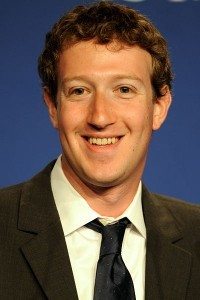

Within about a month of the debut of Fwd.us, Mark Zuckerberg’s new DC lobby outfit aimed at promoting immigration reform, the group is already falling apart. If this week is any indication, the meltdown will be as spectacular and ignoble as every other ill-conceived, overfunded start-up in the Valley.
Fwd.us’ political problems began the way they usually do: with a cynical, too-cute-by-half strategy adopted by his Beltway proxies. Fwd.us’ approach amounted to this: Buy the votes of key lawmakers by dumping money into ads in their home states on issues that are useful to them but that Mark Zuckerberg doesn’t care about.
What that has meant in practice is running commercials supporting South Carolina Senator Lindsey Graham for his bold opposition to Obamacare and his support of the Keystone XL Pipeline, and applauding Alaska Senator Mark Begich for his support for drilling in the Arctic National Wildlife Refuge.
» Read more about: Mark Zuckerberg’s Fwd.us Fail No Surprise »
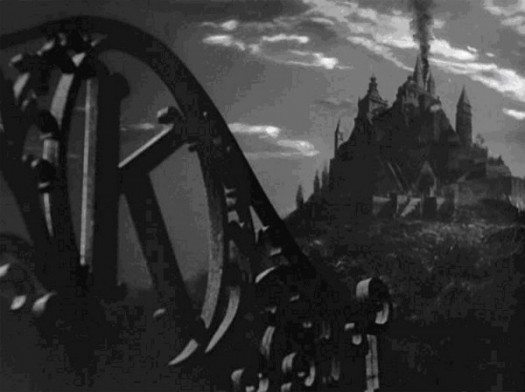

From time to time we may gripe about individual stories or columns that appear in the Los Angeles Times, but it remains our city’s paper of record and a powerful source of investigative journalism – at a time when such journalism has rapidly given way to rumor-sourced blogs written by dilettantes or pundits. That the Los Angeles Times may become the private toy of America’s most partisan conservative interests is not just a bad dream — right-wing billionaires Charles and David Koch may actually soon be running the paper, and it’s up to all of us to stop them.
It’s difficult to overstate how damaging it would be if the Koch brothers succeed in buying one of the country’s most influential newspapers. The Koch brothers would almost certainly use the Times to promote their ultra-conservative agenda. That would mean the end of fair,
» Read more about: Stop the Koch Brothers’ L.A. Times Takeover »
On the most recent Moyers and Company, Bill Moyers turned his attention to the ways underdog communities have organized themselves to win economic victories – in often hostile political environments. Moyers first spoke with Marshall Ganz, the veteran civil rights and United Farm Workers organizer; he then interviewed Madeline Janis, co-founder of the Los Angeles Alliance for a New Economy, and affordable-housing activist Rachel LaForest.
Ganz, a professor at Harvard’s Kennedy School of Government, based his organizing techniques on the moral teachings of his father, who was a rabbi, and on the need to transfer personal narratives onto organizing campaigns. Janis and LaForest have combined traditional organizing techniques with the practical need to adapt to fluid local situations.
As Janis told Moyers:
“You have a struggling housekeeper in a hotel who cleans 25 rooms in a day and barely puts food on the table. The idea of her being able to fight for better working conditions — a union in her hotel,
» Read more about: LAANE’s Madeline Janis Appears on “Moyers & Company” »